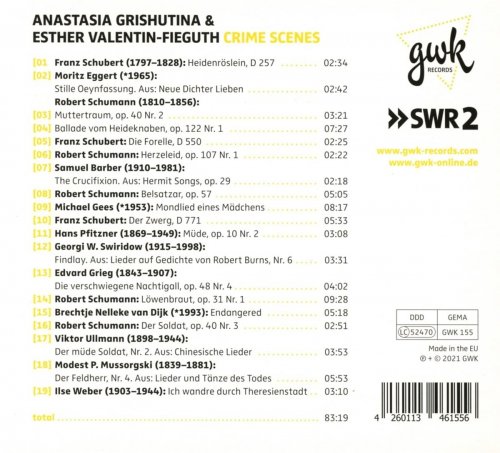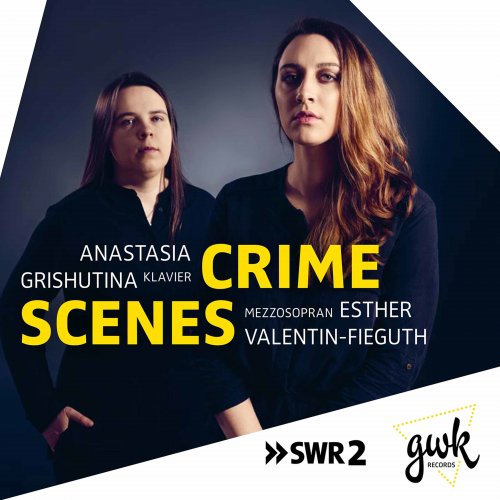
Esther Valentin-Fieguth - Crime Scenes (2022)
BAND/ARTIST: Esther Valentin-Fieguth, Anastasia Grishutina
- Title: Crime Scenes
- Year Of Release: 2022
- Label: GWK Records
- Genre: Classical
- Quality: FLAC (tracks+booklet)
- Total Time: 83:18 min
- Total Size: 268 MB
- WebSite: Album Preview

Tracklist:
1. Heidenröslein, Op. 3 No. 3, D. 257
2. No. 8, Stille Oeynfassung
3. No. 2, Muttertraum
4. No. 1, Ballade vom Haideknaben
5. Die Forelle, D. 550 (1821 Version)
6. No. 1, Herzeleid
7. No. 5, The Cruxifixion
8. Belsatzar, Op. 57
9. Mondlied eines Mädchens
10. Der Zwerg, Op. 22 No. 1, D. 771
11. No. 2, Müde
12. No. 6, Findlay
13. No. 4, Die verschwiegene Nachtigall
14. No. 1, Die Löwenbraut
15. Endangered
16. No. 3, Der Soldat
17. No. 2, Der müde Soldat
18. No. 4, Der Feldherr
19. Ich wandre durch Theresienstadt
The album "Crime Scenes" by mezzo-soprano Esther Valentin-Fieguth and pianist Anastasia Grishutina seems to serve a fashionable theme - but of course there has always been violence and crime. Also poems, stories and songs about it. Poignant, highly dramatic, sometimes humorous, the perfectly attuned duo penetrates deep into the abysses of human passion on their second CD. In between, Valentin-Fieguth and Grishutina tell of moments of happiness and heightened sensitivity to the threat to their existence.
In well-known standards, but also in lesser-known songs by composers from this and the 19th and 20th centuries, they sing about abuse and rape, blasphemy, murder out of instinct or love, crimes against animals, war as a crime, from the Holocaust. “Sweet crimes” are also expressed, as well as, in “Moonlight of a Girl” (Gees, Werfel), which confesses that it is at the center of the program, the plight of a sensitive teenager who threatens to perish from the horrors of the world and her powerlessness . "We tell stories of crimes in our art form, in songs that are mostly not from the 21st century," the performers note in the informative and very personal booklet text. “Nevertheless, they are highly topical, e.g. For example, what happens in the ballad of the Heideknaben unfortunately also happens before our eyes today, but without us always seeing it. That's why it's important to tell stories like this over and over again. Of course, they also provide aesthetic pleasure. But that's exactly how they draw our attention and give us food for thought. And the music makes the story or the scene that is being told even more exciting, more poignant. Even if she is old, maybe even because of that.”
In the context of "Crime Scenes", especially the songs by Eggert, van Dijk, Mussorgski or Weber, the "old stories" of the current repertoire, by Schubert or Schumann, for example, seem new: "We hope that in our recording hears that we have asked ourselves again and again: For what reason is there rape, killing, murdering?"
In well-known standards, but also in lesser-known songs by composers from this and the 19th and 20th centuries, they sing about abuse and rape, blasphemy, murder out of instinct or love, crimes against animals, war as a crime, from the Holocaust. “Sweet crimes” are also expressed, as well as, in “Moonlight of a Girl” (Gees, Werfel), which confesses that it is at the center of the program, the plight of a sensitive teenager who threatens to perish from the horrors of the world and her powerlessness . "We tell stories of crimes in our art form, in songs that are mostly not from the 21st century," the performers note in the informative and very personal booklet text. “Nevertheless, they are highly topical, e.g. For example, what happens in the ballad of the Heideknaben unfortunately also happens before our eyes today, but without us always seeing it. That's why it's important to tell stories like this over and over again. Of course, they also provide aesthetic pleasure. But that's exactly how they draw our attention and give us food for thought. And the music makes the story or the scene that is being told even more exciting, more poignant. Even if she is old, maybe even because of that.”
In the context of "Crime Scenes", especially the songs by Eggert, van Dijk, Mussorgski or Weber, the "old stories" of the current repertoire, by Schubert or Schumann, for example, seem new: "We hope that in our recording hears that we have asked ourselves again and again: For what reason is there rape, killing, murdering?"
Year 2022 | Classical | FLAC / APE
As a ISRA.CLOUD's PREMIUM member you will have the following benefits:
- Unlimited high speed downloads
- Download directly without waiting time
- Unlimited parallel downloads
- Support for download accelerators
- No advertising
- Resume broken downloads


